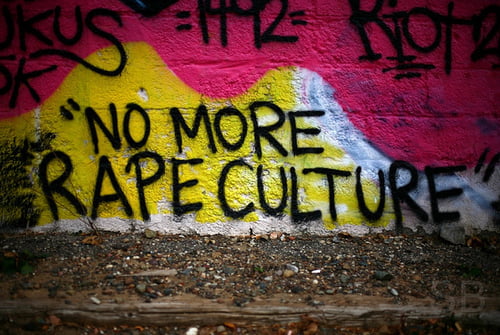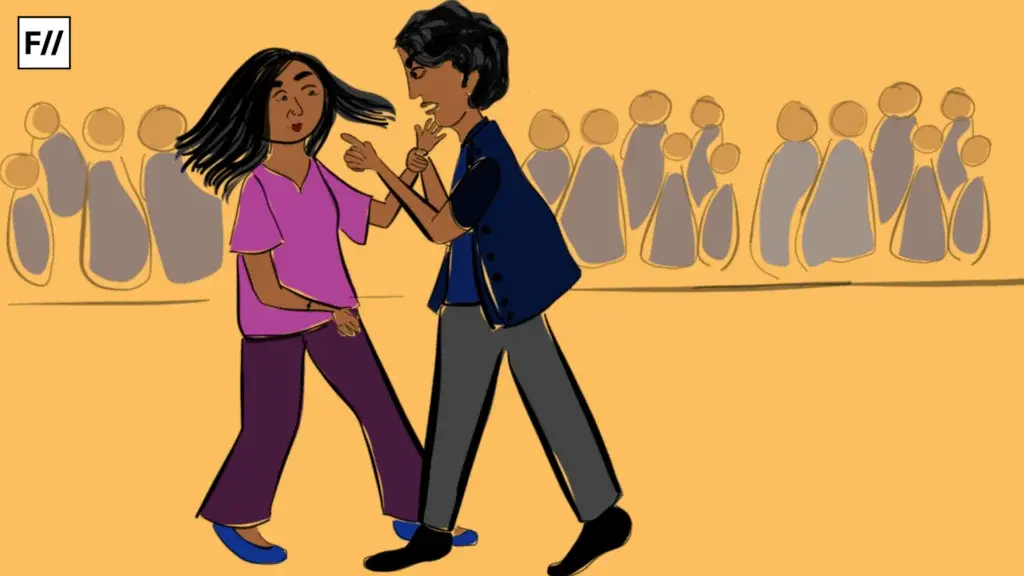Trigger warning: references to rape videos, sexual violence and victim-blaming.
Normalisation of rape culture has gone up to a level where sexual assault has now turned into a marketable commodity with thousands of consumers exchanging it to garner monetary benefits and to satiate their voyeuristic desires. Shockingly, all of this is happening under the nose of local administrative bodies despite extensive media coverage on the issue and subsequent Supreme Court recommendations.
The coverage has largely been restricted to certain areas in Uttar Pradesh, but since the videos are widely circulated to various parts of the country through different messaging apps, it has to be looked upon as a nation-wide issue. According to a report by Aljazeera, the videos can be easily bought from local shops by using code words like “local films” at an affordable cost.
The prices usually fall within the range of Rs 20 to Rs 200. Once the payment is made, the selected videos are transmitted to customer’s mobile phone within seconds. While the faces of the perpetrators in the videos are blurred, the images of survivors are left as it is.
The shopkeepers often steal rape videos from perpetrators’ device when they take their phone to mobile-phone shops to get it repaired. In other cases, as told by local people from a village in Meerut, the assaulters film real incidents of sexual violence and sell it to the shopkeepers to fill their pockets.
“They make it to blackmail the victim so that she doesn’t file complaint to the police”, says a local shopkeeper in Saharanpur district (UP). The clandestine exchange of these videos do not take place in the open market and shopkeepers make sure that non-locals remain unaware of the business. Therefore, these shops are usually located in distant villages far away from general markets.
Also, in order to differentiate rape videos from other porn material, they use watchwords akin to a secret handshake so that they know that the customer is seeking rape videos among available porn videos. The received footage is then circulated through different Whatsapp groups and other messaging mobile applications.
While the faces of the perpetrators in the videos are blurred, the images of survivors are left as it is.
No legal action, persisting trade
Taking into account the wide-spanned racket of rape videos, many activist and media groups brought this issue to the notice of authorities concerned. However, instead of looking up ways to solve the problem, the authorities instantly indulged in the ‘passing the buck’ game, which eventually did not yielded to any concrete results.
Saharanpur’s deputy inspector General of Police Jitendra Kumar Shahi asked for sample videos without realising the fact that it is illegal to circulate such videos. Referring to the suspected shops, he said, “We have directed all our official in different police stations to look into the matter but we were not able to find any rape videos”.
On the other hand, Sanjeev Balyan, a member of parliament from BJP blamed the UP state government for failing to reduce crime against women. Amid Twitter battles and blame games on the matter, the business thrived without any disturbances.
Sunitha Krishnan (founder of Prajwala) initiated a Twitter campaign under the hashtag – #ShameTheRapist after she came across one such rape video on WhatsApp. The campaign was aimed at revealing the face of the rapists who perpetrated such heinous acts and went a step ahead to film it and sell it to local shops.
However, she had to call it off later, suspecting the risk of further circulation of rape videos. Taking cognizance of a petition filed by Krishnan, the Supreme Court of India formed a panel of members comprising employers from different social networking websites to come up with legal and technological solutions for the existing problem. However, no feasible action has been taken so far to stop the problem.
According to Al Jazeera‘s investigative report, the trade still exists in the western parts of Uttar Pradesh under the nose of ignorant local bodies. Moreover, no technology based action has been taken by telecom conglomerates to pull down such content from different web channels.
Also Read: Here’s Why It Is Image-Based Sexual Abuse And Not Revenge Porn
Although there are cyber laws (like IT Act, 2000 and Indecent Representation of Women Act, 1986) which prohibit exchange of dubious content on online platforms, downloading rape videos is not really a tough task. Hence, a lot of activists and lawyers have come forward to appeal for a separate law to put a hold on both the act of filming rapes and the trade of rape videos.
Denial of consent at multiple levels
A rape survivor is mistreated and subjugated at various instances after being sexually assaulted by perpetrators. The level of subjugation increases as she enters justice-providing channels. Her consent is first devalued when she is made into an object of sexual pleasure by perpetrators.
Later, she faces legal disparage when the investigation is maneuvered by local bodies to suit their personal interests. The discourse on the whole is dominated by the administrative bodies rather than the complainant.
Responding to the continuing business of rape videos, Lalitha Kumaramangalam (Member, National Commission for Women) speaks about involving survivors in the present case, so that police don’t use lack of complaints as an excuse to brush aside the matter. She says, “If somebody brings up the issue, the local police may try to take some action. And I say ‘may’- very conscious of the word I am using.”
It is important to note here that one cannot overlook the survivors’ trauma. They are often mistreated and misrepresented by administrative bodies and media groups respectively, who don’t pay attention to real issues and leave no stone unturned in further maligning their image.
However, with certain technical and legal reforms, the survivors can be encouraged to be vocal about the sale of rape videos, as this murky business accelerates the process of consent denial. While rape in itself is a non-consensual act, uploading rape videos and using it as an object to make money further deprives the survivor of the rights over her body.
American Scholar James F. Hodgson and Debra S. Kelley’s book – Sexual Violence: Policies, practices and challenges in the US talks about rape laws, common ideology and community response. It also provides an extensive study of the process of how the commodification of sexual assault manifests from three levels of subjugation, namely – framing the body, denying the body and women as ‘no’ body.
they use watchwords akin to a secret handshake so that they know that the customer is seeking rape videos.
Although their analysis is based on rape cases in US and Canada, the above mentioned subjugation levels can be placed in the present context as well. All of this equally contributes to how forced sexual intercourse is turned into a visual treat for men through the sale of rape videos which takes no account of survivor’s consent.
Another area where women are denied power and agency over her identity and existence is online harassment in the forms of rape threats, stalking and morphing. The fact that women (who are victimised in those rape videos) are reluctant to speak against perpetrators who put their rape videos on sale, reveals the idea of embedded chauvinism and display of male dominance that tries to curtail the survivor’s freedom of expression on the lines of identity defamation.
Owning the narrative: legal, technical & medical support
Considering the wide reach of internet and its easy accessibility, we urgently need a feasible gatekeeping mechanism which immediately pulls down rape videos from both web channels (untraceable online spheres) and accessible websites so that people are unable to upload such videos on different online spheres. For instance, a popular porn site – xHamster pulled down all the content with the keywords linked to rape or forced assault and also advised seekers to get in touch with a professional psychologist.
A similar mechanism can be used to remove real rape videos, especially on websites mostly accessed by Indians. Although the central government has decided to crack down on videos of rape and child pornography by deliberating upon creation of hash banks and separate hotline portals to set-up easy means to report such cases, no technical mechanism in whatsoever form has come to the fore since.
In order to encourage survivors to disclose the identities of assaulters fearlessly, we need a robust medical support system which caters to both the physical and mental health of survivors so that they can recover and disclose the identity of the perpetrators. It is important to note here that technical, legal and medical support, in some way or the other, should attempt to hand over the reins of the narrative to survivors who are generally sidelined from the larger legal and political discourse.
However, the present picture reveals a different story. While activism is trivialised with limited support (both on online and offline platforms), the legal and administrative procedures are largely biased towards men, thereby overlooking the consent and suggestions of the survivors in the process.The fatal nexus of embedded patriarchy, rape culture, business of rape videos and flawed political systems can only be destroyed when rape survivors have a say in the process of re-establishment of justice themselves.
Also Read: Image-Based Sexual Abuse, Or Revenge Porn As Depicted In Films
Featured Image Credit: Socialism.in
About the author(s)
Tanya is a post-graduate in Media Studies from Centre for Culture, Media and Governance at Jamia Milia Islamia. She is passionate about music, cinema and lots of street food.





Oh my god, this is hard reading. I have to break away before reading some more. Must’ve been emotionally fraught to write as well.
I can’t imagine the trauma of these women. How bleak and desolate. The injustice of this is soul-crushing.
Public policy must step up. Thanks to groups and orgs who are fighting for stronger laws, medical support.
Come on, India, we can do so much better. Speak up, rally. Hold lawmakers and law enforcement accountable. The media needs to be more responsible too. Stop this industrialized war on women.
Tanya, I have read your few posts but this is really about to “Speak OUT” the truth.
Do write on women with disability specially intellectual disability where not only the rape, even you will find the survival is even noticed differently.
God bless you!!